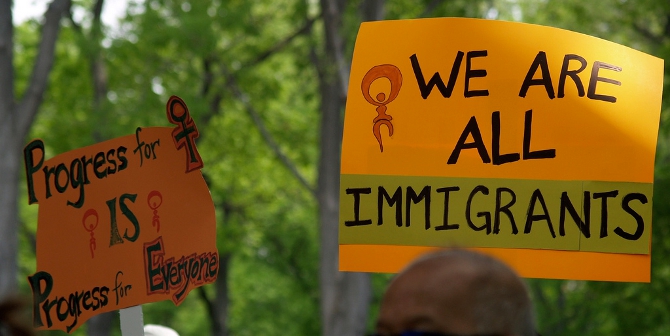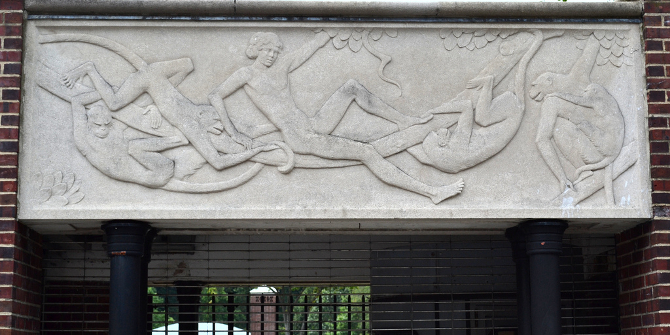 Recent decades have seen an increasingly hostile and negative environment towards immigrants in the U.S., especially in the attitudes of law enforcement towards undocumented immigrants. In new research, Helga Leitner looks at the ways in which the groups and networks that advocate on immigrants’ behalf are challenging this discursive environment and are creating new political spaces. She writes that these groups seek to frame undocumented migrants as worthy of inclusion in society based on their humanity rather than their potential contribution to economy and society, and that they also aid in the creation of welcoming policies at different scales such as ‘sanctuary cities’, day laborer centres and immigrant serving organizations.
Recent decades have seen an increasingly hostile and negative environment towards immigrants in the U.S., especially in the attitudes of law enforcement towards undocumented immigrants. In new research, Helga Leitner looks at the ways in which the groups and networks that advocate on immigrants’ behalf are challenging this discursive environment and are creating new political spaces. She writes that these groups seek to frame undocumented migrants as worthy of inclusion in society based on their humanity rather than their potential contribution to economy and society, and that they also aid in the creation of welcoming policies at different scales such as ‘sanctuary cities’, day laborer centres and immigrant serving organizations.
During the past two decades, immigrants in the United States have encountered an increasingly restrictive political landscape. Beginning in the mid-1990s, the federal government dramatically expanded both the policing of the U.S.-Mexico border and the enforcement of immigration laws within the national territory, most recently through federal-local immigration enforcement partnership programs such as Secure Communities, which enroll local police into federal immigration enforcement. In addition, states, counties and municipalities have passed exclusionary policies designed to deter and/or expel undocumented immigrants from their territories. Examples include anti-solicitation ordinances, crafted to prevent migrant workers from congregating in public space to solicit work, overcrowding ordinances thwarting extended family living in the same housing unit, English-only ordinances and resolutions prohibiting local governments from conducting nonemergency business in other languages; and employer fines for hiring undocumented immigrants, etc. Most notably, immigration laws in Arizona and Alabama have sought to require local police to determine the immigration status of persons arrested or detained, if there is reasonable suspicion that they are in the country without authorization.
These developments have not remained uncontested, however. Immigrants and their allies have mobilized to resist increasingly restrictive and exclusionary policies. Through legal challenges, protests and other forms of mobilization, they have entangled a number of exclusionary policies in legal battles, causing some to be declared unconstitutional. Immigrant advocacy in the United States is complex as well as highly diverse socially, politically and geographically. The base of the immigrant advocacy movement is a plethora of sometimes highly localized, but networked organizations that include labor unions, churches, civic organizations, and civil-rights groups. Immigrant advocacy also is multiethnic and multiracial in character, bringing together immigrants from a variety of countries also with native-born whites, African Americans, and Latinos. In short, immigrants are not acting alone. The most visible groups seeking to advance immigrants’ rights in the formal political process are national immigrant advocacy and civil rights organizations such as the National Council of La Raza, the National Immigration Forum, and the American Civil Liberties Union.
Inspired by Bonnie Honig’s argument that we should shift from asking “How should we solve the problem of foreignness?” to “What problems does foreignness solve for us?” we looked at the role of immigrant advocacy in liberal democratic citizenship and liberal democracy, through an analysis of the exclusionary policies and immigrant advocacy struggles in the Washington DC metropolitan area. This region is representative of new immigrant gateways and has been both a hotspot of local immigration policies (since 2005, almost half of its cities, counties and towns have passed exclusionary immigration ordinances) as well as a center of immigrant advocacy.

Our research finds that immigrant advocacy is pushing the boundaries of liberal democratic citizenship, which, as it currently stands, is generally associated with a bundle of rights and obligations conferred by a single nation-state. By contrast, immigrant advocacy is a form of citizenship which entails active participation in civic and political life through discourses and practices that: challenge in some cases existing laws, policies and institutions; promote alternative criteria for membership in a polity; and lay claims to and enact new form of citizenship and rights. Examples include discursive framings and creating new political spaces.
New discursive frames
The groups and networks advocating on behalf of immigrants differ in terms of the political imaginaries behind their actions, and the discursive frame they use to express grievances and make demands. A common frame, advanced particularly by national immigrant and civil rights organizations, presents immigrants as hard-working and responsible laborers. This representation fits squarely into the conception of the neoliberal citizen-subject as a self-reliant and responsible individual. This can be seen as a strategic framing to justify both rights claims and migrants’ incorporation into and belonging to the national community. Although this framing in terms of economic contributions goes beyond the currently dominant political and cultural criteria for the attribution and acquisition of citizenship in liberal democratic states, it remains state-centered and reaffirms the national community and national citizenship as the dominant measure of belonging. This is not the case with a second, humanitarian frame deployed by immigrant advocates that is expressed in the phrase “No Human Being is Illegal”. This frames undocumented migrants as worthy of inclusion in a community because they are human beings, not just because they contribute to the (local) economy and society. It also undermines the privileging of the nation-state and national citizenship as the arbiters of decisions about belonging.
Creating new political spaces
Besides stretching the discursive boundaries of liberal democratic citizenship, local and regional advocacy organizations also have been active in creating new political spaces, both within and outside of the formal political system. Immigrant advocacy has resulted in the passage of new, welcoming policies at a variety of scales. A number of U.S. cities have adopted “sanctuary city” ordinances prohibiting local police from participating in immigration enforcement, and have approved resolutions supporting immigrants. A smaller number of cities have issued identity cards for immigrants, extending to them the right to vote in local elections irrespective of formal citizenship status. The state of Illinois approved a 2013 policy that permits undocumented immigrants to obtain drivers’ licenses.
Beyond the formal political system, immigrant advocates have sought to transform the political landscape at a variety of scales, constructing spaces of encounter and deliberation between migrants and long-term residents of various political persuasions. One very visible space constructed by immigrant advocates in US cities is day laborer centers, located both alongside streets and in shopping centers. In the DC metropolitan area, organizations such as CASA de Maryland, the state’s largest immigrant-serving organization, operate centers that connect workers with employers, while also providing English language instruction and job training classes. Other such spaces are more ad hoc venues for deliberation among differently positioned individuals and groups, including members of immigrant organizations, churches, politicians and local businesses (e.g. Centreville Immigration Forum).
As our research shows, not all groups and organizations involved in immigrant advocacy advance and enact discourses that question established patterns of control and authority, or promote values and rationalities beyond those generally associated with liberal democratic citizenship. But many do, as the examples above indicate. Discursive strategies, such as deploying humanitarian frames of belonging and the transnational engagement of members of the immigrant advocacy exceed the entrenched national territorial boundaries of liberal democratic citizenship. Locally, workers’ centers, often hotly contested, provide spaces that serve, protect, and welcome immigrants. Last but not least, the appropriation of space and convening of public forums create new political spaces for deliberation, which are crucial in formulating new values and developing new criteria for citizenship and belonging.
This article is based on the paper ‘Spaces of Immigrant Advocacy and Liberal Democratic Citizenship’ in the Annals of the Association of American Geographers.
Please read our comments policy before commenting.
Note: This article gives the views of the author, and not the position of USApp– American Politics and Policy, nor of the London School of Economics.
Shortened URL for this post: http://bit.ly/1jfLdhF
_________________________________
 Helga Leitner – University of California, Los Angeles
Helga Leitner – University of California, Los Angeles
Helga Leitner is a professor in UCLA’s Department of Geography. Her research interests include international migration, the politics of immigration and citizenship, urban development & sustainability, global urbanism, urban social movements, and socio-spatial theory.






